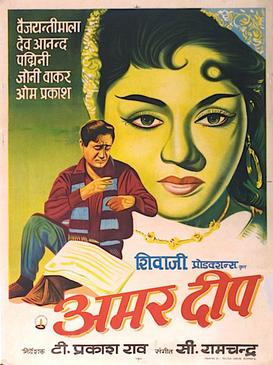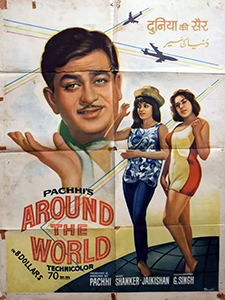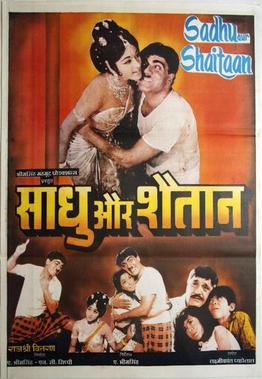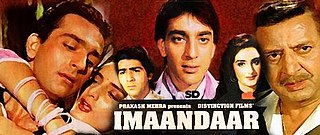
Kundan Lal Saigal, often abbreviated as K. L. Saigal, was an Indian singer and actor who worked in Hindi cinema, which was centred in Calcutta (Kolkata) during Saigal's time, but is currently based in Bombay (Mumbai). Saigal's unique voice quality which was a mixture of baritone and soft tenor was the benchmark for most of the singers who followed him. In fact it remains the gold standard even today shining through very early and practically primitive recording technology. He did not sing songs on which other actors would lip-sync for the camera. It was only towards the very last stages of his career, during 1945 to 1947, that he sang to make studio recordings, and these were for himself as the actor on the screen. Thus, while other singers in Hindi Cinema are playback singers, he was not a playback singer.

Kaifi Azmi was an Indian Urdu poet. He is remembered as the one who brought Urdu literature to Indian motion pictures. Together with Pirzada Qasim, Jaun Elia and others he participated in many memorable Mushaira gatherings of the twentieth century. He was also a communist who wanted to see India one day become a socialist state. His wife was theatre and film actress Shaukat Kaifi.

Pran Krishan Sikand Ahluwalia, better known by his mononym, Pran, was an Indian actor, known as one of the greatest villains ever in the history of Indian cinema and a character actor in Hindi cinema from the 1940s to the 1990s. He has been one of the most highly successful and respected veteran actors in the history of Indian cinema. He was also one of the highest-paid actors of his time.

Khursheed Bano, often credited as Khursheed or Khurshid, was a singer and actress, and a pioneer of the Indian cinema. Her career ran through the 1930s and 1940s, before she migrated to Pakistan in 1948. Making her debut with Laila Majnu (1931), she acted in over thirty films in India. She is best known for her film Tansen (1943) with actor-singer K. L. Saigal, which featured many of her memorable songs.
Shashikala Saigal, better known by her first name, was an Indian film and television actress, who played supporting roles in hundreds of Bollywood films beginning in the 1940s.

Dil Tera Deewana is a 1962 Hindi-language comedy film. The film was directed by B.R.Panthulu, and written by Inder Raj Anand and Raj Baldev Raj.

Amar Deep is a 1958 Indian Hindi-language romantic drama film directed by T. Prakash Rao, under Sivaji Productions. The film stars Dev Anand, Vyjayanthimala, Padmini, Ragini, Johnny Walker, Pran, Om Prakash. The film's music was composed by C. Ramchandra. It is a remake of Rao's 1956 Tamil film Amara Deepam, based on the 1942 American film Random Harvest which had earlier been adapted in Bengali as Harano Sur (1957).

Around the World is a 1967 Indian Hindi-language romantic comedy film written and directed by Pachhi. It stars Raj Kapoor as an Indian who travels around the world with five thousand rupees. The film also starred Rajshree, Ameeta, Om Prakash, and Mehmood. It was India's first film to be released in 70 mm format and was shot all around the world.

Insaniyat Ke Dushman is a 1987 Hindi-language action drama film directed by Rajkumar Kohli. The film features an ensemble cast of Dharmendra, Shatrughan Sinha, Raj Babbar, Sumeet Saigal, Dimple Kapadia, Anita Raj, Amjad Khan, Shakti Kapoor, Kader Khan, Aruna Irani, along with Smita Patil in a special appearance. The film revolves around a young lawyer seeking revenge against the perpetrators who raped his sister and drove her to suicide. It also contains a subplot revolving around an honest cop and his brother, and how the need for wealth drives them apart and leads to a situation where the cop is forced to arrest his own brother.
This is a bibliography of notable books on Hindi cinema.
Lagan is a 1941 Indian Hindi language film. It was the fifth highest grossing Indian film of 1941. The film was directed by Nitin Bose for New Theatres Ltd. Calcutta. The film was a bilingual with K. L. Saigal and Kanan Devi acting as the lead in its Bengali language version, Parichaya. The music for both versions was by R. C. Boral. This was the last film Saigal did for New Theatres, Calcutta, before his move to Bombay to make films for different studios there.

Bhakta Surdas is a 1942 Indian Hindi language film devotional film. It was the third highest grossing Indian film of 1942. This was K. L. Saigal's first film after his move to Bombay from Calcutta. The film was directed by Chaturbhuj Doshi for Ranjit Studios. It had music by Gyan Dutt with lyrics by D. N. Madhok. Khursheed, after acting in several less popular films, finally became a big success with this film. The cast included K. L. Saigal, Khursheed, Monica Desai, Nagendra, M. Saigal and N. Desai.

Sadhu Aur Shaitaan is a 1968 Hindi film directed by A. Bhimsingh. The film stars Om Prakash, Pran in title roles, along with Mehmood, Bharathi, Kishore Kumar in lead roles. The movie is a remake of 1966 Tamil suspense-comedy Sadhu Mirandal.

Gope was an Indian actor of Hindi cinema. Starting his career with a small role in Insaan Ya Shaitaan (1933), directed by Moti Gidwani and produced by Eastern Arts Production, Gope went on to act in over one hundred forty films in a career spanning twenty-four years from 1933 to 1957. Several of his films were released following his death. Best known for his comedy roles, he is stated to be one of Hindi cinema's "most popular comedians". His acting in comic roles won him "critical and popular acclaim" and he soon became "the leading comedian of his time". His popularity assured him of being mentioned in the credit roll of films along with the main cast. He became famous for lip-syncing the popular number "Mere Piya Gaye Rangoon" from Patanga, playbacked by C. Ramchandra for Gope and by Shamshad Begum for Nigar Sultana.

Imaandaar is a 1987 Indian Bollywood action crime drama film directed by Sushil Malik and produced by Surendra Pal Choudhary and Mrs. Sarla Sandhu. The film stars Sanjay Dutt, Farah in lead roles, along with Rohan Kapoor, Ranjeet, Mehmood, Pran, Om Prakash in supporting roles.
Mohabbat Ki Kasauti also called Rooplekha in Bengali was a 1934 Indian "semi-historical" bilingual film in Hindi and Bengali, directed by P. C. Barua for New Theatres. Though Barua is consistently mentioned as the director, according to author J. K. Bajaj, Debaki Bose directed Rooplekha in 1934. It had music by R. C. Boral and the cast included Rattanbai, K. L. Saigal, Pahari Sanyal, Noor Mohammed Charlie and Vishwanath. Jamuna started her career with a small role in the Hindi version.

Bhai-Bhai (transl. Brothers) is a 1956 Indian Hindi-language drama film directed by M. V. Raman for A. V. M. Productions. It had screenplay by Javar Seetharaman, with Hindi screen adaptation of the Tamil film Ratha Paasam directed by C.V. Sridhar. The music director was Madan Mohan, with dialogues and lyrics written by Rajendra Krishan. One of the popular songs from the film was "Ae Dil Mujhe Bata De", sung by Geeta Dutt, "in an unabrasive fast tempo". The song became one of Madan Mohan's earliest hits, and the music of the film in journalist-author Bharatan's words, went on to "conquer the box office".

Meena Shorey was a Pakistani film actress who worked first in Indian cinema and later Pakistani cinema. She appeared in Hindi/Urdu and Punjabi films. Credited in films by her mononym, Meena, her real name was Khurshid Jehan. She started her acting career playing a character role, as Ambhi, Raja of Taxila's sister in Sohrab Modi's Sikandar (1941). Married to her third husband, Roop K. Shorey, by the mid-1940s, she found fame when she acted in her husband's film Ek Thi Larki (1949), opposite actor Motilal. The story was written by I. S. Johar, who also starred in the film. The "foot-tapping" music composed by Vinod became a "huge hit", with Meena becoming an "icon" for the "new liberated" young women. Meena was acclaimed as the "Lara Lappa Girl", from the song of same title in the film. She was one of the first women to be recognised in Indian cinema as a "comedienne of calibre". She was also popularly known as The Droll Queen of Partition as she worked as a comedienne [Droll] in both in India and Pakistan [countries resulting from partition].














